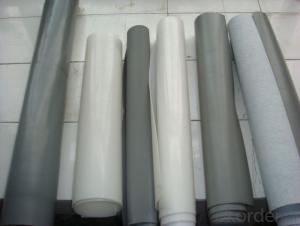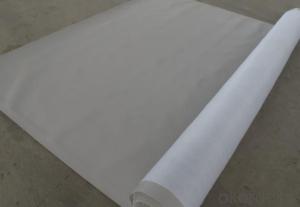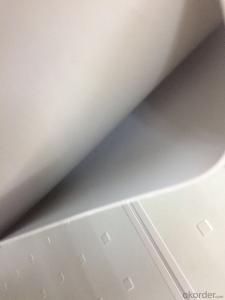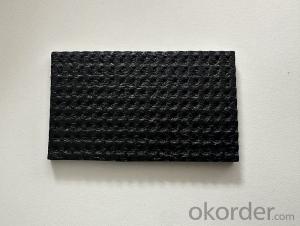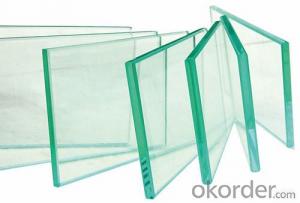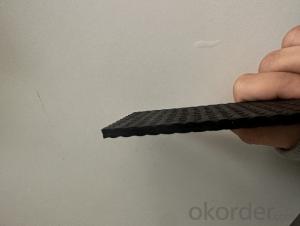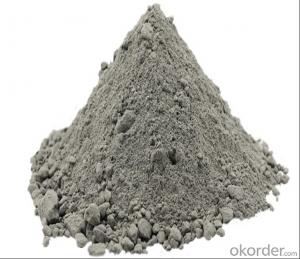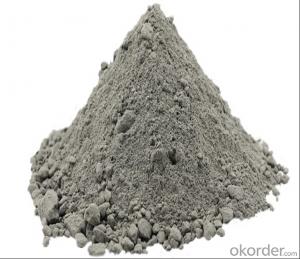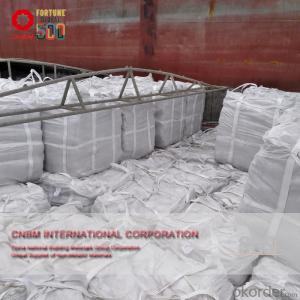PVC Waterproofing Membrane 1.5 mm from Manufactory
- Loading Port:
- Tianjin
- Payment Terms:
- TT OR LC
- Min Order Qty:
- 5000 m²
- Supply Capability:
- 100000 m²/month
OKorder Service Pledge
OKorder Financial Service
You Might Also Like
PVC waterproofing membrane
Polyvinyl Chloride (PVC) waterproof membrane is a new polymer waterproof membrane which is made from polyvinyl chloride resin, and mixed with plasticizer, filler, antioxygen, ultraviolet absorber and other auxiliaries.
Product Applications:
1. All kinds of roofs, such as steel structure roof, planted roof etc.
2. Underground engineering, such as basement, subways, tunnels, air raid shelter, etc.
3. Other projects like artificial lake, dam, water reservoir, grain storehouse, etc.
Product Features:
1. Excellent aging resistance.
2. Root resistant penetration, specially used on planting roof.
3. Welding installation. Joints are solid and environment friendly, no pollution.
4. High tensile strength, good elongation and dimensional stability.
5. Good plasticity, easy and suitable for details installation.
6. Fireproof. Fire extinguished out of the ignition resource.
Product Specifications:
1. Size: 2.05(width)*20m (length), as clients' request
2. Thickness: 1.2mm; 1.5mm; 2.0mm, etc
3. Type: Homogeneous, Reinforced, Fabric back
4. Exposed and Non-exposed
5. Color: white, Grey or customized
FAQ:
Q: Can I get samples?
A: Yes, we could arrange samples for free.
Q: Can I do the third party testing before loading?
A: Yes, we could accept the third party testing.
Q: Which kind of payment in your company?
A: We could accept TT, LC at sight, etc.
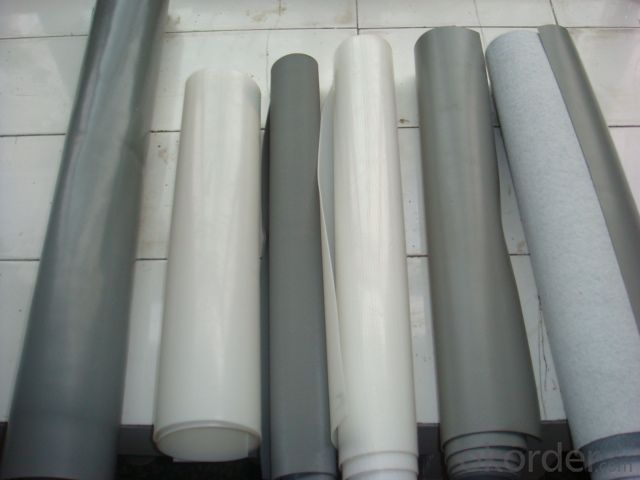
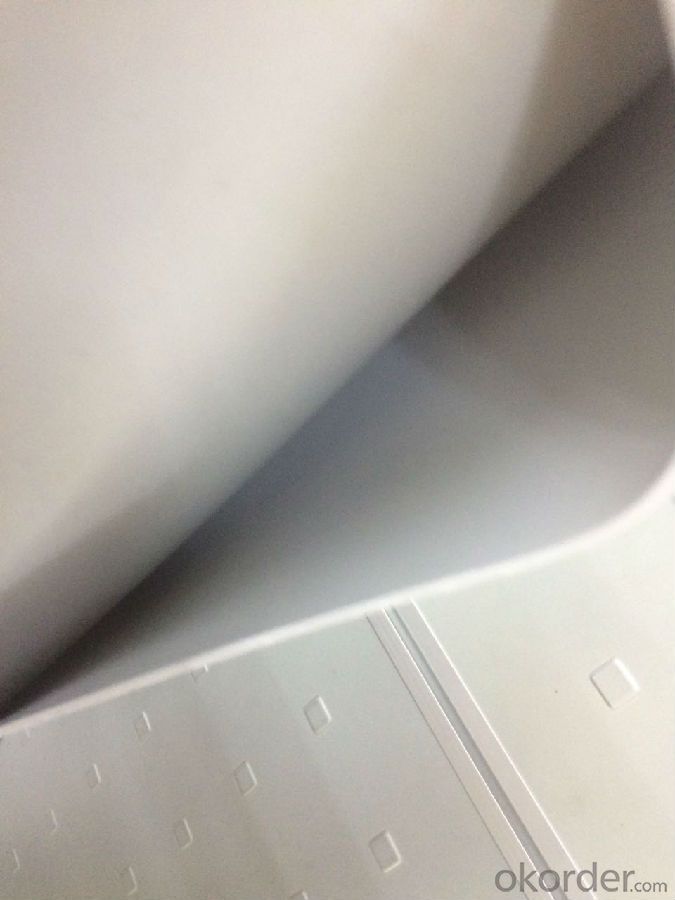
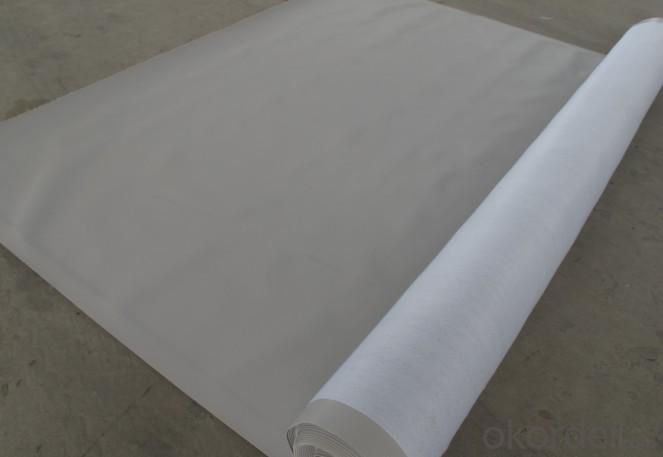
- Q:Can a waterproofing membrane be applied to vertical surfaces?
- Vertical surfaces can indeed have a waterproofing membrane applied to them. In reality, waterproofing membranes are frequently utilized on vertical surfaces, like walls, foundations, and retaining walls, for the purpose of safeguarding against water infiltration. These membranes are specifically engineered to stick to vertical surfaces and create a protective barrier against water, thereby thwarting moisture from seeping into the structure. The process of application generally involves cleansing and preparing the surface, applying a primer if necessary, and then affixing the waterproofing membrane using an appropriate adhesive or mechanical fastening system. This guarantees that the membrane forms a continuous and secure seal, effectively preventing water from penetrating. In summary, waterproofing membranes provide an efficient solution for waterproofing vertical surfaces and are extensively employed in construction and building maintenance projects.
- Q:Pvc waterproof membrane of the scope of application
- The scope of products: ????Polyvinyl chloride (PVC) waterproofing membrane due to the use of a unique product formula, the product life is far beyond the general waterproof material, the excellent performance of the membrane so that it is widely used in various fields of waterproof. ???1, for industrial and civil construction of the roof waterproof, including planting roof, flat roof, slope roof. ???2, the building underground waterproof: including reservoirs, dams, pools, drains and all parts of the basement waterproof. ???3, tunnels, grain depots, civil air defense projects, landfill, artificial lake waterproofing.
- Q:Can a waterproofing membrane be used on metal surfaces?
- A waterproofing membrane is capable of being utilized on metal surfaces, providing protection against water infiltration. These membranes are specifically designed to safeguard various materials, including metal, from water damage. They are primarily composed of modified bitumen, EPDM, PVC, or TPO, which offer a resilient and impervious barrier. By applying a waterproofing membrane to a metal surface, one can effectively ward off corrosion, rust, and water-related harm. This makes it a suitable solution for shielding metal structures, roofs, or surfaces that are exposed to moisture or water. However, it is crucial to ensure that the chosen waterproofing membrane is compatible with the specific type of metal surface and that proper installation guidelines are adhered to in order to achieve optimal performance and durability.
- Q:Are waterproofing membranes resistant to water vapor transmission?
- Yes, waterproofing membranes are designed to be resistant to water vapor transmission. They are specifically engineered to prevent the penetration of water vapor through the membrane, ensuring effective waterproofing and moisture control.
- Q:Can a waterproofing membrane be used on precast copper surfaces?
- Precast copper surfaces can indeed utilize a waterproofing membrane. These membranes possess adaptability and can be utilized across a diverse range of surfaces, including copper. Their primary purpose is to establish a protective barrier that hinders water infiltration and safeguards the underlying structure from moisture-induced harm. With accurate application, a waterproofing membrane can proficiently seal precast copper surfaces, securing enduring defense against water intrusion. Nevertheless, it is vital to verify the compatibility of the membrane with copper and conduct thorough surface preparation to guarantee optimal adhesion and performance.
- Q:Can a waterproofing membrane be used on terracotta surfaces?
- Terracotta surfaces can benefit from the use of a waterproofing membrane. Due to its porous nature, terracotta absorbs water and can suffer damage and deterioration as a result. To prevent such issues, applying a waterproofing membrane creates a barrier that stops water from penetrating and safeguards the material against moisture-related problems. Acting as a protective layer, the membrane keeps the terracotta surface dry and prevents water from seeping through. This is especially advantageous in areas with high moisture levels or where terracotta is exposed to water, like bathrooms, kitchens, or outdoor installations. To ensure compatibility and effectiveness, it is crucial to select a waterproofing membrane specifically designed for terracotta surfaces. Additionally, following proper surface preparation and application techniques is essential for achieving optimal results.
- Q:Can a waterproofing membrane be used on roofs?
- Roofs can indeed benefit from the usage of a waterproofing membrane. It is quite common to find these membranes on flat or low-slope roofs, as they offer an extra layer of protection against water infiltration. The materials used for these membranes are typically synthetic, including modified bitumen, EPDM, PVC, or TPO. These materials are chosen for their durability, flexibility, and ability to resist UV rays, weathering, and ponding water. When installed correctly, a waterproofing membrane effectively safeguards the underlying roof structure by preventing water from seeping in, thus safeguarding the building from potential leaks and water damage.
- Q:Can a waterproofing membrane be used for theme parks or amusement centers?
- Yes, a waterproofing membrane can be used for theme parks or amusement centers. These types of facilities often have water features, pools, or water rides that require effective waterproofing to prevent leaks or water damage. Waterproofing membranes provide a reliable and durable solution to keep these areas watertight, ensuring the safety and longevity of the park or center.
- Q:Can a waterproofing membrane be used on precast brick surfaces?
- Yes, a waterproofing membrane can be used on precast brick surfaces. Precast brick surfaces are susceptible to water penetration, which can cause damage to the structure and lead to mold or mildew growth. Applying a waterproofing membrane can provide an effective barrier against water infiltration and protect the precast brick surface. The membrane is typically made of a flexible and durable material such as rubberized asphalt, modified bitumen, or polyurethane. It is applied to the surface using a brush or roller, and it creates a continuous and seamless layer that prevents water from seeping into the bricks. Additionally, the waterproofing membrane can also help to improve the overall thermal insulation of the precast brick surfaces and enhance their longevity. However, it is important to ensure that the precast bricks are clean, dry, and properly prepared before applying the membrane to ensure optimal adhesion and effectiveness.
- Q:Are waterproofing membranes resistant to chlorine exposure?
- Waterproofing membranes can vary in their resistance to chlorine exposure. Some membranes are specifically designed to be resistant to chlorine and are commonly used in applications where chlorine exposure is expected, such as pool decks or water treatment facilities. These membranes are typically made with materials like PVC or TPO that have inherent resistance to chlorine and can withstand prolonged exposure without significant degradation. However, it is important to note that not all waterproofing membranes are chlorine-resistant. Some membranes, particularly those made with materials like EPDM or bitumen, may not be as resistant to chlorine and may experience deterioration or damage when exposed to chlorine for extended periods. To ensure the longevity and effectiveness of a waterproofing membrane in a chlorine-rich environment, it is crucial to select a membrane that is specifically designed and tested for chlorine resistance. Consulting with a waterproofing professional or manufacturer can help determine the most suitable membrane for the specific chlorine exposure conditions.
1. Manufacturer Overview |
|
|---|---|
| Location | |
| Year Established | |
| Annual Output Value | |
| Main Markets | |
| Company Certifications | |
2. Manufacturer Certificates |
|
|---|---|
| a) Certification Name | |
| Range | |
| Reference | |
| Validity Period | |
3. Manufacturer Capability |
|
|---|---|
| a)Trade Capacity | |
| Nearest Port | |
| Export Percentage | |
| No.of Employees in Trade Department | |
| Language Spoken: | |
| b)Factory Information | |
| Factory Size: | |
| No. of Production Lines | |
| Contract Manufacturing | |
| Product Price Range | |
Send your message to us
PVC Waterproofing Membrane 1.5 mm from Manufactory
- Loading Port:
- Tianjin
- Payment Terms:
- TT OR LC
- Min Order Qty:
- 5000 m²
- Supply Capability:
- 100000 m²/month
OKorder Service Pledge
OKorder Financial Service
Similar products
New products
Hot products
Related keywords
